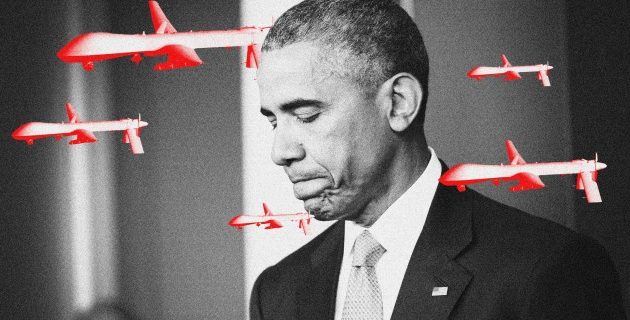Drone-strikes – A Pacifist’s Ideal Weapon?
Drone-strikes are the nearest thing possible to a pacifist’s ideal weapon. They pose no risk to one side in an engagement, and the studies that exist show that on the ground the ration of unintended casualty rates are lower than in any other form of military engagement. When people complain about ‘collateral’ damage caused by drone strikes on the Afghanistan/Pakistan border, for instance, they should consider how much bloodier an engagement would be expected were the Pakistani army to be sent in.
But like every other means of warfare, drone-warfare throws up its own ethical and moral problems. Not the least of them has been the growth in the legalisation of war at the same time as what some critics would describe as its bureaucratisation. This week this came around to hit David Cameron. Earlier this month two British citizens fighting for ISIS in Syria were killed by a British-ordered drone-strike. David Cameron announced this to the House of Commons. The Prime Minister described the strikes as ‘entirely lawful’ and said that the government was ‘exercising Britain’s inherent right in self-defence.’ Elsewhere there were briefings to the press suggesting that the two men posed an imminent danger to the UK, including possibly even to Her Majesty the Queen.
Here and in others of its statements on the strikes, the government has wandered into some very undesirable areas. The questions around these drone strikes initially appeared to surround the legality of British strikes taking place inside Syria rather than solely inside Iraq. But questions over the precise nature of the intelligence information which led to the strikes also began to be voiced. And now this week the charity ‘Reprieve’, with the backing of the Green Party’s Member of Parliament among others, has announced that they are starting a legal challenge against the government’s decision. They claim that the basis of this legal action will surround the legality of military operations in countries where Britain is not officially at war. But it is likely to spill into a scavenging mission to find out about the nature of the intelligence which gave rise to the strike. Given the already slightly shifting story from the government on the urgency of the strike it is possible there is a weakness somewhere in here.
Among the things the UK government should learn from this is something which the last Labour government also had to learn – which is the danger of announcing anything more than the absolute bare minimum when it comes to matters of intelligence.There will always be a demand for more information – from the public, media and legal-profession – but the demand should be ignored. Intelligence is too delicate a matter to ever be politicised.
But attention should not be only on the government. It should also be on those people like Caroline Lucas MP and Reprieve who seek to make even drone-warfare effectively impossible. The general public have little sympathy or care for young British men who go to Syria to indulge their desire for sadism and butchery. The niceties and even legalities of their deaths are of little interest to most of them. But that voice is barely if ever heard. It is the voice of the tiny minority of activists who oppose such strikes who are always most heard. But it is they – the people who try to make even British drone-missions a legal impossibility – who are the ones who have the most difficult questions of all.

FROM THE DIRECTOR’S DESK
Is this the week that the West finally abandoned the remnants of its shattered moral authority in the Syrian crisis? It would appear so.
We squandered the opportunity to hold President Assad to account for his violation of international agreements through the use of chemical weapons in 2013. We have failed to prosecute the war against ISIS with any degree of vigour, meaning that it drags on as a conflict of attrition. And we now appear to be subcontracting decision-making in the region to Russia’s President Putin given the military firepower he has deployed to assist Assad in the past couple of weeks, with more seemingly to follow.
Our weakness and indecision contrasts unfavourably with Putin’s opportunism and determination. He has seen our dithering as an opportunity to not only ensure that his Syrian puppet remains in office, thereby maintaining Russian influence in the Middle East, but to humiliate the West by forcing it to sacrifice its values in the process. Our demands that the mass murderer who began this conflict and who is largely responsible for its perpetuation can be no part of the new Syria have begun to be set aside. Where once we said Assad had to go, now we say Assad may need to stay for a transitionary period.
But there will be no transition if Assad stays. He won’t be going anywhere. Putin knows it. Assad knows it. And our own leaders know it too. They are too ashamed to say it, but that is what Russia’s plan for Syria means.
Some will say we will have the consolation prize of a full international assault against ISIS which will drive it out of Syria and Iraq. This may be true. But it will be a pyrrhic victory if so. Because the seeds of the next ISIS will have already been sown by our betrayal of human rights and freedom in the conclusion of such a squalid deal. Islamists the world over will clamour to recruit more of our own impressionable young citizens for the next jihadi hotspot, using the duplicity of the West as a rallying cry to the need for a pure Islam which can defend the true believers.
In the meantime, Assad will be free to wreak vengeance on the remainder of Syria’s population, Hezbollah will secure a permanent arms supply route to benefit from the advanced weaponry flowing into Syria, and Iran will be emboldened to make its own advances in the region. If Putin can get away with it, why can’t the mullahs?
This is the stark future facing our leaders as they decide how to react to Russia’s posturing. They can accept it. Or they can call Putin’s bluff, put together their own plan for a Syrian future without Assad, and get on with implementing it.
Dr Alan Mendoza is Executive Director of The Henry Jackson Society
Follow Alan on Twitter: @AlanMendoza



Leave a Reply
Want to join the discussion?Feel free to contribute!